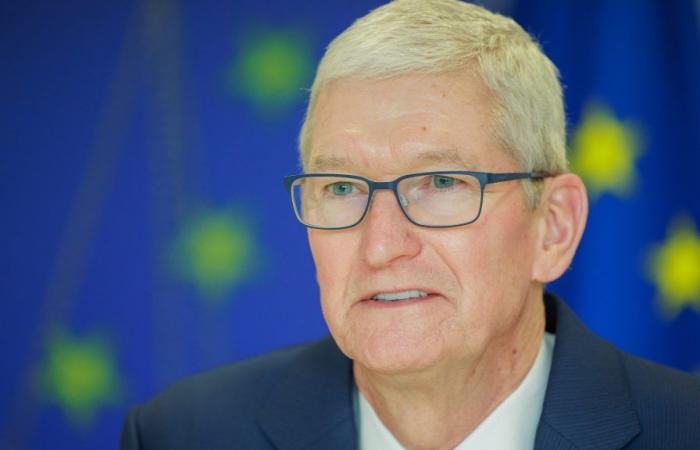Questioned by Numerama, the European Commission judges Apple’s decision not to launch several functions of iOS 18 in France positively. She sees it as proof that this « integration of AI can be anti-competitive » and that the regulation permitted by the DMA legislation pushes large platforms to be cautious.
Apple will release major new features on its devices this fall, including Apple Intelligence (generative artificial intelligence integrated into its operating systems) and iPhone Mirroring (the screen of your iPhone on your Mac). These functions will not arrive immediately in the European Union, because the American company says it fears “ regulatory uncertainties caused by the Digital Markets Act (DMA) ».
The standoff between Apple and the European Commission is not new, but until now it had never prompted the brand to block new products in Europe. The Californian brand undoubtedly hopes that its customers in the Old Continent will put pressure on the EU in order to make it relax its policy. Questioned by Numerama, the European Commission, which has just condemned Apple for violating the DMA, sees things differently. From his point of view, Apple’s capitulation is a victory for European regulation.
« A sign of concern for the rest of the world »: Brussels welcomes the blockage
Brussels would like to emphasize that this decision is not due to any action on its part, since Brussels does not follow Apple’s commercial announcements. “Apple has unilaterally decided not to launch functions in the European Union”declares Thomas Regnier, spokesperson for the European Commission, to Numerama.“We can’t comment on the features without having seen them”he explains.
It specifies that large platforms have an obligation to provide reports and demonstrations to the teams responsible for compliance with the DSA and the DMA. “More than 100 people” work on ensuring proper compliance with these two texts by major American groups, and are in constant contact with them.
This content is blocked because you have not accepted cookies and other trackers. This content is provided by YouTube.
To be able to view it, you must accept the use carried out by YouTube with your data which may be used for the following purposes: allowing you to view and share content with social media, promoting the development and improvement of products from Humanoid and its partners, display personalized advertisements to you in relation to your profile and activity, define a personalized advertising profile, measure the performance of advertisements and content on this site and measure the audience of this site (find out more more)
By clicking on “I accept all”, you consent to the aforementioned purposes for all cookies and other trackers placed by Humanoid and its partners.
You can withdraw your consent at any time. For more information, we invite you to read our Cookies Policy.
I accept everything
Manage my choices
For her part, the Vice-President of the European Commission, Margrethe Vestager, sees this above all as an indicator suggesting uncertainty at Apple. “Apple’s decision to suspend the rollout of AI features for iPhones in the EU over fears of breaking the law is a sign of concern for the rest of the world”she said at a press conference on June 24.
The person concerned also says she is surprised to see that other jurisdictions are not concerned about the fact that “this integration of AI could be anti-competitive”while Apple itself seems to think that it cannot launch Apple Intelligence in Europe as it stands.
“For the European Union, this is a positive message. The very large platforms have never been regulated before, they put in place what they wanted. Today, it shows to what extent the largest platforms in the world are affected by legislation”, analyzes Thomas Regnier. The fact that the decision comes from Apple itself, without intervention from the Commission, is seen as a victory.
The Digital Markets Act (DMA) forces large platforms, with more than 45 million users each month (equivalent to 10% of the European population), to open up to competing services, not to impose services exclusively and to be accountable to the European Union. It aims to encourage the emergence of new tools by preventing giants from crushing everything in their path.
Is Apple right to fear Europe?
Is Apple’s withdrawal from the European market simply an excess of caution, with the sole aim of putting pressure on regulators? The reaction from Brussels suggests the opposite, while Europe seems to be satisfied with the unavailability of iOS 18 functions on the Old Continent. The Commission still expects Apple to adapt its services in the future, since the EU is “an ultra-attractive market with 450 million users”recalls its spokesperson.
What about blocking the iPhone Mirroring function, which allows you to see your iPhone screen on Mac? Without having seen it in action, the European Commission cannot comment on its technical functioning, but it nevertheless says it is very surprised by the interpretation of the brand. There is nothing to suggest that such a system is incompatible with the DMA. What the Commission wants is to “give freedom to ensure the market remains open”, which suggests that the integration of a single AI into an entire ecosystem, without opening up to competition, is not possible. But nothing technically blocks the other functions.
Asked about the risk that the particularities of the DMA lead to regulation which harms the interests of the consumer, the spokesperson rejects this idea voluntarily conveyed by the companies which are now suffering its effects. “The DMA wants small startups to be able to be competitive. It doesn’t benefit consumers to have giants crushing everyone. » In short, Apple Intelligence in France is not for now, even if the Commission says it is open to discussions with Apple. The brand, for its part, is committed “to work with the European Commission to try to find a solution”.
Do you want to know everything about the mobility of tomorrow, from electric cars to e-bikes? Subscribe now to our Watt Else newsletter!






